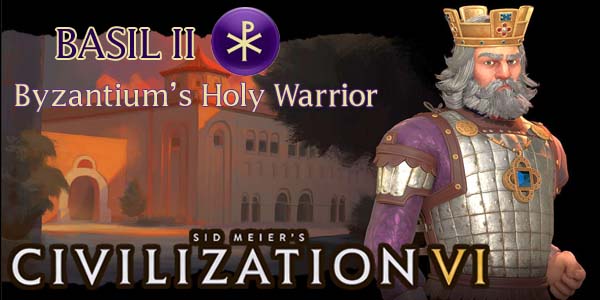
Firaxis has released the final update for its "New Frontiers" DLC Pass for Civilization VI. I have attempted to create guides for each new civilization included in the packs, but there is one civilization that I just didn't have time to cover when it was first released. That civilization was part of the September 2020 update, and it is the Byzantine Empire, lead by Basil II.

It looks like "New Frontiers" represents the end of the Civilization VI life cycle. If that is true, then don't fret. If I get enough demand from my Patrons, I'll also write guides for the "New Frontiers" game modes, or go back and create / update guides for legacy leaders. We also have new games such as Old World and Humankind coming out. I'll be playing both games when they release on Steam, and can also write guides for those games, if my supporters ask for it.
By the third century AD, the Roman Empire had expanded to control much of Asia Minor and the Eastern Mediterranean. The cities in the eastern Greek, Asia Minor, and eastern African provinces tended to be larger and more developed than settlements in the west, owing largely to the Greek and Macadonian empires that had preceeded Rome's occupation of the regions. This made these cities far wealthier than most western cities, and in 330 AD, Emperor Constantine relocated the Roman capital to the city of Byzantium due to its strategic location at the epicenter of trade routes between Europe and Asia, and between the Mediterranean and Black seas. The empire was later split into Western and Eastern administrative partitions, each with its own emperor. When Rome was sacked in 476 and the Western Roman Empire collapsed, the Eastern Empire in Constantinople continued to thrive.
It can be argued, thusly, that the Roman Empire survived until the fall of Constantinople to the Ottoman Turks in the 15th century. However, even though the Byzantine Empire can trace its authority directly to Imperial Rome, and it retained much of the legal and administrative framework inherited from the Roman Empire, eastern culture had begun to diverge from western culture before even the fall of Rome. Most citizens of the Eastern Empire may have considered themselves to be "Roman", but they spoke Greek instead of Latin. The architecture utilized ornate domes and spires as opposed to the austere columns, arches, and triangles of Latin architecture. Religious practices in the east also gradually transitioned away from the dogmatic practices of the Catholic Church until the Schism of 1054 formally established the Eastern Orthodox Church. It is, thus, equally accurate to say that the Byzantine Empire came to represent its own unique culture, independent of the Western Roman Empire.
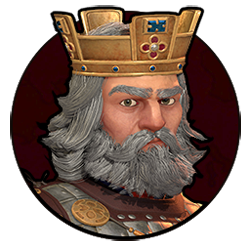
Basil II Porphyrogenitus was a life-long ruler of the Eastern Roman Empire. He was coronated as co-emperor along with his brother when he was just two years old, and ascended to the status of senior emperor at the age of 18, ruling until his death almost 50 years later. For most of his reign, he personally lead his armies into battle against Anatolian rebels, Bulgaria, the Fatimid Caliphate, and the Kingdom of Georgia, securing the empire's borders in both the west and east. Despite being away from Constantinople for so long, he also found time to distinguish himself as an administrator, reforming tax and property laws to protect poor land-owners from exploitation by wealthier elites. He also married off his sister to Vladimir I of Kiev, securing an alliance with the Kievan Rus and converting them to Orthodox Christianity. His reign was so successful, that the Empire prospered for decades after his death, despite his successor emperors being considered largely inept by both contemporary writers and modern historians. Though he is considered a national hero by the Greeks, he is known as "Basil the Murderer" by Bulgarians.
Basil II favors aggressive religious play backed up with a powerful mounted army and navy. He should seek to convert or conquer rival holy cities as soon as possible, then crush or convert his remaining rivals.
[More]
9717627d-e9ed-44d7-b203-9c3945c77bcd|2|5.0
Tags:Sid Meier's Civilization, Civilization VI, Byzantine Empire, Byzantium, Basil II, porphyrognnetos, taxis, hippodrome, tagma, dromon, Divine Guardian, entertainment complex, amenity, cavalry, heavy cavalry, navy, religion, holy city, prophet
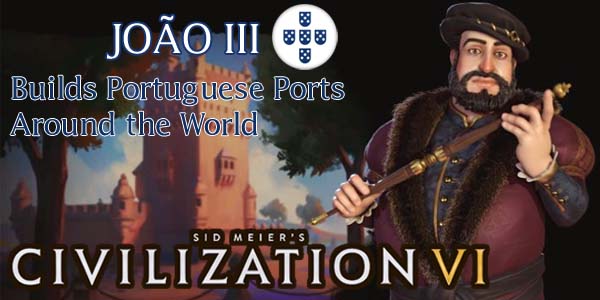
Firaxis has released the final "New Frontiers" update for Civilization VI. This update from March 2021 includes the new civilization Portugal, lead by João III.
If Firaxis decides to launch a second "New Frontiers" season, I will continue to write guides for the new civilizations and leaders. I will also put up polls on Patreon to let my Patrons decide which civ or leader to cover first (if Firaxis gives enough advance notice).

If "New Fontiers" is the end of the life cycle of Civilization VI, then don't fret. If I get enough interest from my Patrons, I'll also write guides for the "New Frontiers" game modes, or go back and create / update guides for legacy leaders. We also have new games such as Old World and Humankind coming out. I'll be playign both games when they release on Steam, and can also write guides for those games, if my supporters ask for it.
Portugal rose to prominence during the "Age of Discovery" in the 15th and 16th centuries, exploring the world and becoming the first global maritime empire. It established colonies and/or outposts in Brazil, Africa, India, and east Asia, it monopolized the spice trade, and was responsible for the formalization of the division of the globe into hemispheres. Portugal's dominion was short-lived however. A devastating earthquake in Lisbon in 1755, followed by occupation by Napoleonic France, and the eventual independence of Brazil combined to collapse the Portuguese maritime empire.

Portugal's maritime empire was laregely secured by King João III "The Pious" during his reign in the first half of the 16th century. João III established the first European colonies in Brazil and began importing Brazilwood into Europe, which was popular for creating red dyes. He was considered a scholar, humanist, and diplomat who supported the arts, granted scholarships to foreign universities, and remained neutral in wars between other European powers. But history is never so black-and-white, and João III is no exception. He also imported South American slaves into Europe from Brazil, and he boosted Portugal's relationship with the Vatican by allowing the Inquisition to establish itself in Portugal.
DISCLAIMER:
Civilization VI is still a "living game". Strategies for the game (and for specific leaders and civs) may change as Firaxis applies balance patches, introduces new features, or expands the game through further DLC or expansion packs, or as the Civ community discovers new strategies or exploits. As such, the following strategy guide may change from time to time. I will try to keep it up-to-date, and will make notations whenever changes are made. I'll also post links in the official 2K forums and CivFanatics, where I'll also report any changes made. If possible and practical, I will try to retain the original content of the strategy for posterity.
I welcome any feedback or suggestions that readers wish to offer. Feel free to post on the linked forums, or by posting a comment at the bottom of the page.
This guide is up to date as of the release of the [final] "New Frontiers" April 2021 Update (ver. 1.0.12.9)
João III explores the map to meet all other civilizations and city states, and will seek to establish peaceful trade relations with all of them, including constructing trade infrastructure in those other civilizations' cities. [More]
2a321222-ca59-47b4-8957-6177b584e9a1|0|.0
Tags:Sid Meier's Civilization, Civilization VI, Portugal, Portuguese, Joao III, casa da India, porta do cerco, navigation school, nau, caravel, feitoria, navigator's legacy, campus, navy, trade route, exploration, diplomacy, first contact
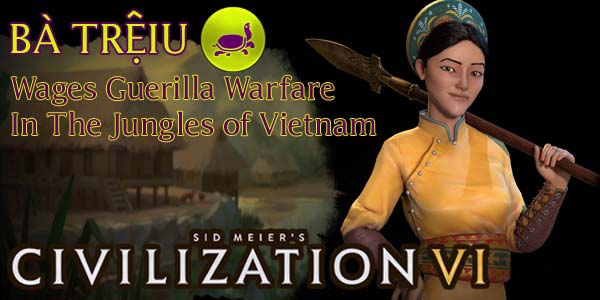
Firaxis is almost done with its New Frontiers DLC pass for Civilization VI. In January, they released a pack including the leader Bà Triệu of Vietnam. New Frontiers updates are planned through March of 2021, so I expect we'll see another pack with one or two new civilizations or leaders.

With Firaxis wrapping up with New Frontiers leaders, I may go back and write guides for the new game modes. I'm especially interested in the Corporations and recently-released Barbarian game modes. I may put up a poll on my Patreon page to let my Patrons decide what guides to create next. I hope you'll consider supporting the creation of this content on Patreon, and exercising your voting power to help influence the content I create. Your support is greatly appreciated!
The state of Vietnam, located along the eastern coast of the Indochinese Peninsula, has spent much of its existence under the rule or occupation of other states. Classical Vietnamese kingdoms existed as early as the 29th century BC. The borders of Vietnam shifted over the next couple thousand years while warlords fought each other for dominance of the region, before Vietnam was annexed by the Chinese Han Dynasty in 111 BC. After some short-lived independence movements from leaders such as the Trưng Sisters and Lady Triệu, the state finally gained full independence from the Chinese in 938 AD, but saw periods of Chinese, French colonial, and Japanese occupation in the following centuries before defeating the United States in 1975 and beginning the process of reunification under communist rule.
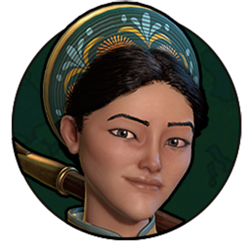
During the Three Kingdoms period of China during the third century, Bà Triệu lead an unsuccessful campaign to liberate Vietnam from Chinese occupation. Little is known about her life, and all of what is known comes from now-legendary Vietnamese sources. She is believed to have been an orphan who witnessed atrocities commited by the Chinese Wu Dynasty, and, as a teenager, raised an army in a secret military camp in the mountains. Her campaign saw two years of success at driving out Chinese occupations over the course of more than 30 battles. After the Chinese finally began taking her rebellion seriously, Lady Triệu held her ground for months before finally being defeated by the overwhelming forces of the Chinese. Some sources say she was killed in battle, while others say that she survived, but was so dismayed at her defeat that she committed suicide by throwing herself in a river (in the same fashion as the rebellious Trưng Sisters centuries earlier). While the Chinese records never bother to mention her name (or that the leader of the rebellion was a woman), she quickly became a legendary national hero among the Vietnamese, and began to take on exaggerated super-human qualities. The Ho Chi Minh army even recruited a large number of women soldiers during the American Vietnam War in keeping with the tradition set by The Trưng Sisters and Lady Triệu.
DISCLAIMER:
Civilization VI is still a "living game". Strategies for the game (and for specific leaders and civs) may change as Firaxis applies balance patches, introduces new features, or expands the game through further DLC or expansion packs, or as the Civ community discovers new strategies or exploits. As such, the following strategy guide may change from time to time. I will try to keep it up-to-date, and will make notations whenever changes are made. I'll also post links in the official 2K forums and CivFanatics, where I'll also report any changes made. If possible and practical, I will try to retain the original content of the strategy for posterity.
I welcome any feedback or suggestions that readers wish to offer. Feel free to post on the linked forums, or by posting a comment at the bottom of the page.
This guide is up to date as of the release of the "New Frontiers" January 2021 Update (ver. 1.0.9.9)
Bà Triệu is a highly defensive leader who can also be a potent threat in an offensive guerrilla war. Vietnamese cities and units all benefit from colonizing dense forests or jungles, as districts must be placed on these features. [More]
2aca68f4-1954-4b98-bbaa-7110eb4f941b|1|5.0
Tags:Sid Meier's Civilization, Civilization VI, Vietnam, Ba Treiu, nine dragon river delta, drive out the aggressor, thanh, voi chien, defender of the homeland, forest, rainforest, marsh, district, elephant
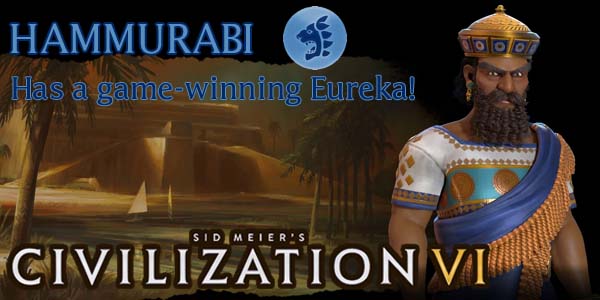
Firaxis will be releasing Civilization VI DLC packs with new game modes, new civilizations, and new leaders through March of 2021. November's update added a very unique leader to the Civilization VI roster: Hammurabi of Babylon. Both the Babylonian civilization and its leader Hammurabi have been playable in multiple past iterations of the Civilization series, but Hammurabi's leader ability is so unique and game-changing that I felt I had to cover it immediately.

For future releases that include multiple leaders or civilizations, I may put up polls on Patreon to let my Patrons decide which civ or leader to cover first (if Firaxis gives enough advance notice). I may also put up polls asking if my Patrons would prefer that I make guides focused on the new game modes. So if you would like to vote on which content you would prefer to see sooner, I hope you'll consider supporting the creation of this content on Patreon.
The city of Babylon is one of the earliest cities ever built, having been settled between the 23 and 19th century B.C.. It was built along banks of the Euphrates River, south of modern-day Bagdad, with steep embankments in order to contain and utilize the river's seasonal floods. It is believed that Babylon was the most populous city in the world during the two heights of the Babylonian empire in 17th century B.C. and 6th century B.C., and it was the first city to reach a population of 200,000.
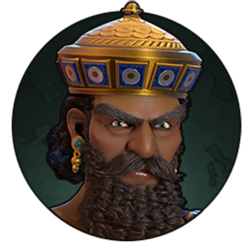
Hammurabi is an ancient Babylonian king who ruled in the 18th century B.C.. He is famous for his Code of Laws that was long believed to be the first set of codified laws ever created. There were, however, earlier codes of laws, but Hammurabi's code differed from earlier codes by establishing the principle of the presumption of innocence for the accused, and that the accuser and accused must both provide evidence to establish guilt or innocence. It also limited the amount of retribution that the victim my inflict upon the guilty by prescribing set penalties for specific crimes. Though many prescribed punishments were brutal (such as disfigurement or execution), the code ensured that the victim of a minor crime would not respond by murdering the criminal. Hammurabi had his law transcribed (in the common language) onto a cylindrical stele and placed at the center of town so that every literate person could read it, presumably so that everyone would know what constitutes a crime and what the punishment for each crime is, so that the administration of justice would be seen as fair to the populace.
DISCLAIMER:
Civilization VI is still a "living game". Strategies for the game (and for specific leaders and civs) may change as Firaxis applies balance patches, introduces new features, or expands the game through further DLC or expansion packs, or as the Civ community discovers new strategies or exploits. As such, the following strategy guide may change from time to time. I will try to keep it up-to-date, and will make notations whenever changes are made. I'll also post links in the official 2K forums and CivFanatics, where I'll also report any changes made. If possible and practical, I will try to retain the original content of the strategy for posterity.
I welcome any feedback or suggestions that readers wish to offer. Feel free to post on the linked forums, or by posting a comment at the bottom of the page.
This guide is up to date as of the release of the "New Frontiers" November 2020 Update (ver. 1.0.8.4)
Babylon is a powerful technological force in Civilization VI, that acquires technologies primarily by completing eurekas. It also gets large food bonuses when settling adjacent to rivers, that allows its cities to grow quickly and grow large, and new districts get a head start in infrastructure. [More]
5f65ce87-0093-404d-b243-d4d037af2ecf|1|5.0
Tags:Sid Meier's Civilization, Civilization VI, Babylon, Hammurabi, enuma anu enlil, ninu ilu sirum, palgum, sabum kibittum, Cradle of Civilization, science, eureka, cavalry, anti-cavalry, water mill, river, fresh water, district, building, envoy
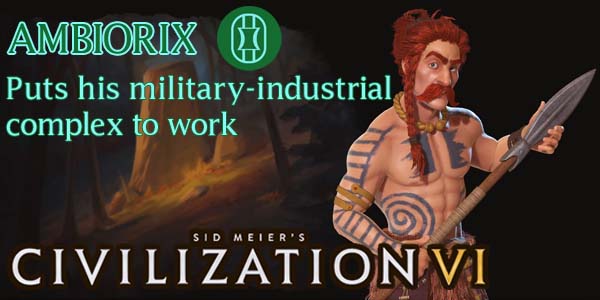
Firaxis will be releasing Civilization VI DLC packs with new game modes, new civilizations, and new leaders through March of 2021. Two new civilizations were released at the end of September. One of which is entirely new to the Civilization franchise. That new civ is Gaul, which is lead by Ambiorix.

For future releases that include multiple leaders or civilizations, I may put up polls on Patreon to let my Patrons decide which civ or leader to cover first (if Firaxis gives enough advance notice). I may also put up polls asking if my Patrons would prefer that I make guides focused on the new game modes. So if you would like to vote on which content you would prefer to see sooner, I hope you'll consider supporting the creation of this content on Patreon.
Gaul (or Gallia in its original Latin) is the name the Romans gave to a region of Western Europe that now encompasses France, Belgium, Netherlands, and parts of Germany and Austria. The land was inhabited by industrious Celtic tribes that frequently raided Greek and Phoenician settlements in southern Europe. Around 1200 BC, the small settlement of Hallstatt (near modern Salzburg, Austria) built an economy around salt mining and developed advanced metal-working techniques. These techniques spread throughout the tribes of Gaul until Hallstatt was abandoned for unknown reasons around 500 BC.
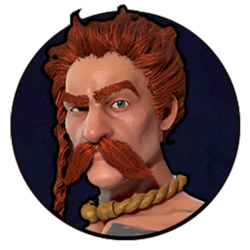
Ambiorix (whose name possibly translates to "protector-king") was a king of the Eburones clan in Belgian Gaul. After a drought destroyed much of the Roman harvests in Gaul, Julius Caesar requested that the Eburones give up their grain harvests to feed occupying Roman troops. Ambiorix conceeded, but he and his men soon joined the resistance against Caesar. The resistance did not last long, as the insult caused Rome to lead a genocidal campaign to exterminate the rest of the Eburones.
Overall, the Gauls held off the might of the Roman Republic until Gaul was finally subdued by Julius Caesar, who contracted tribes of Gauls to help him in his fight against the other tribes. The conquest of Gaul spring-boarded Caesar towards his destiny. Though the "Barbarians at the gates" theory is a widely-known explanation for the fall of Roman Empire, there is also the competing (or complimentary) theory of "Barbarians inside the gates". As Rome's conquests expanded across Europe and North Africa, the growing empire needed more and more soldiers to defend its borders. As such, later emperors opened military service to non-Romans, including Gallic mercenaries. These troops retained much of their Celtic culture, spoke Romanticized Gallic instead of Latin, had never been to Italy, and so had little loyalty to Roman law or culture. They fought for whoever would pay for their services, and their loyalty to their commanding officers enabled internal conflict that contributed to Rome's downfall as much (or perhaps more) than external threats.
When Belgium became an independent nation in 1830, historians found Caesar's accounts of Ambiorix (who Caesar praised as the "bravest and strongest of the Gauls"), and the government annointed him as a national hero. Poems and statues were commemorated in Ambiorix's honor throughout Belgium. Today, he is also a pop hero, appearing in Belgian cartoons and comic books.
DISCLAIMER:
Civilization VI is still a "living game". Strategies for the game (and for specific leaders and civs) may change as Firaxis applies balance patches, introduces new features, or expands the game through further DLC or expansion packs, or as the Civ community discovers new strategies or exploits. As such, the following strategy guide may change from time to time. I will try to keep it up-to-date, and will make notations whenever changes are made. I'll also post links in the official 2K forums and CivFanatics, where I'll also report any changes made. If possible and practical, I will try to retain the original content of the strategy for posterity.
I welcome any feedback or suggestions that readers wish to offer. Feel free to post on the linked forums, or by posting a comment at the bottom of the page.
This guide is up to date as of the release of the "New Frontiers" October 2020 ("Pirates") Update (ver. 1.0.6.9)
In Civilization VI, Ambiorix spreads his cities out a bit more, fueling his economy and culture with mines. He also swarms his opponents with units that support each other and promote the cultural development of the civilization.
[More]
6344ece6-72a6-4b15-a745-1a72ad1bb754|1|5.0
Tags:Sid Meier's Civilization, Civilization VI, Gaul, Ambiorix, king of the Eburones, Hallstatt culture, oppidum, gaesatae, scourge of Rome, industrial zone, production, quarry, mine, culture
|

| 12 | | | | | | | 60 | | 11 | | | | | | | 55 | | 10 | | | | | | | 50 | | 09 | | | | | | | 45 | | 08 | | | | | | | 40 | | 07 | | | | | | | 35 | | 06 | | | | | | | 30 | | 05 | | | | | | | 25 | | 04 | | | | | | | 20 | | 03 | | | | | | | 15 | | 02 | | | | | | | 10 | | 01 | | | | | | | 05 |
|